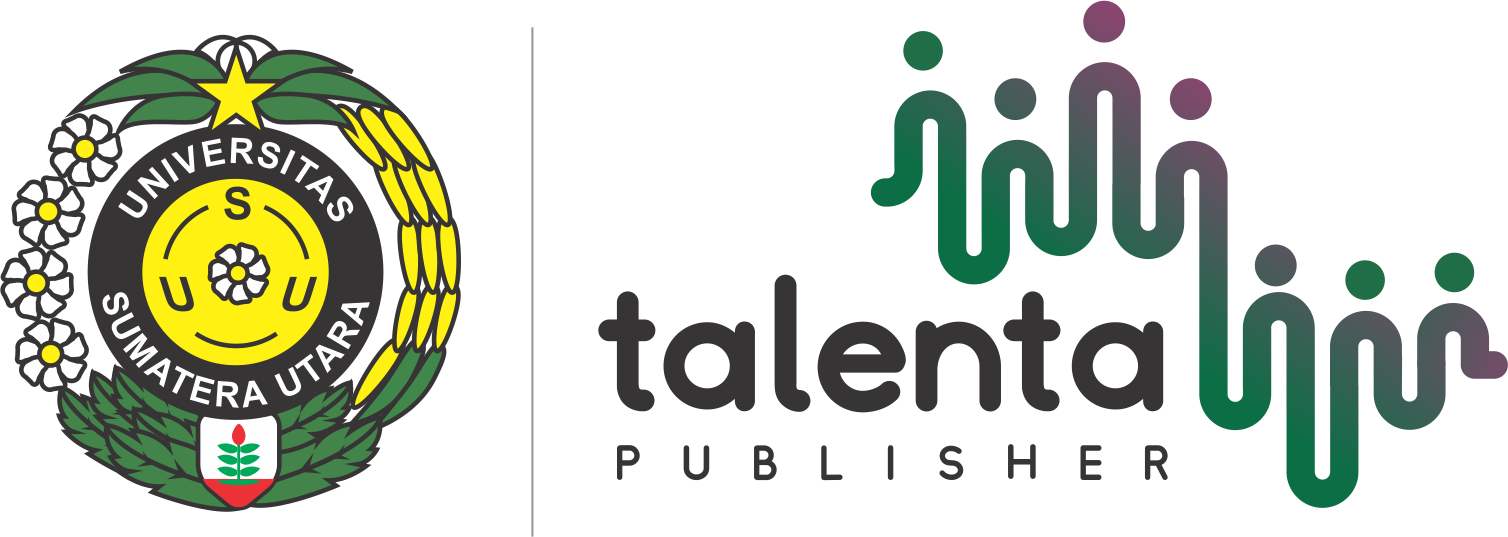Conference Archives
The 4rd International Seminar On Language, Culture And History (ISLCH) 2022
Medan
Medan, ID
November 3, 2022 – November 4, 2022
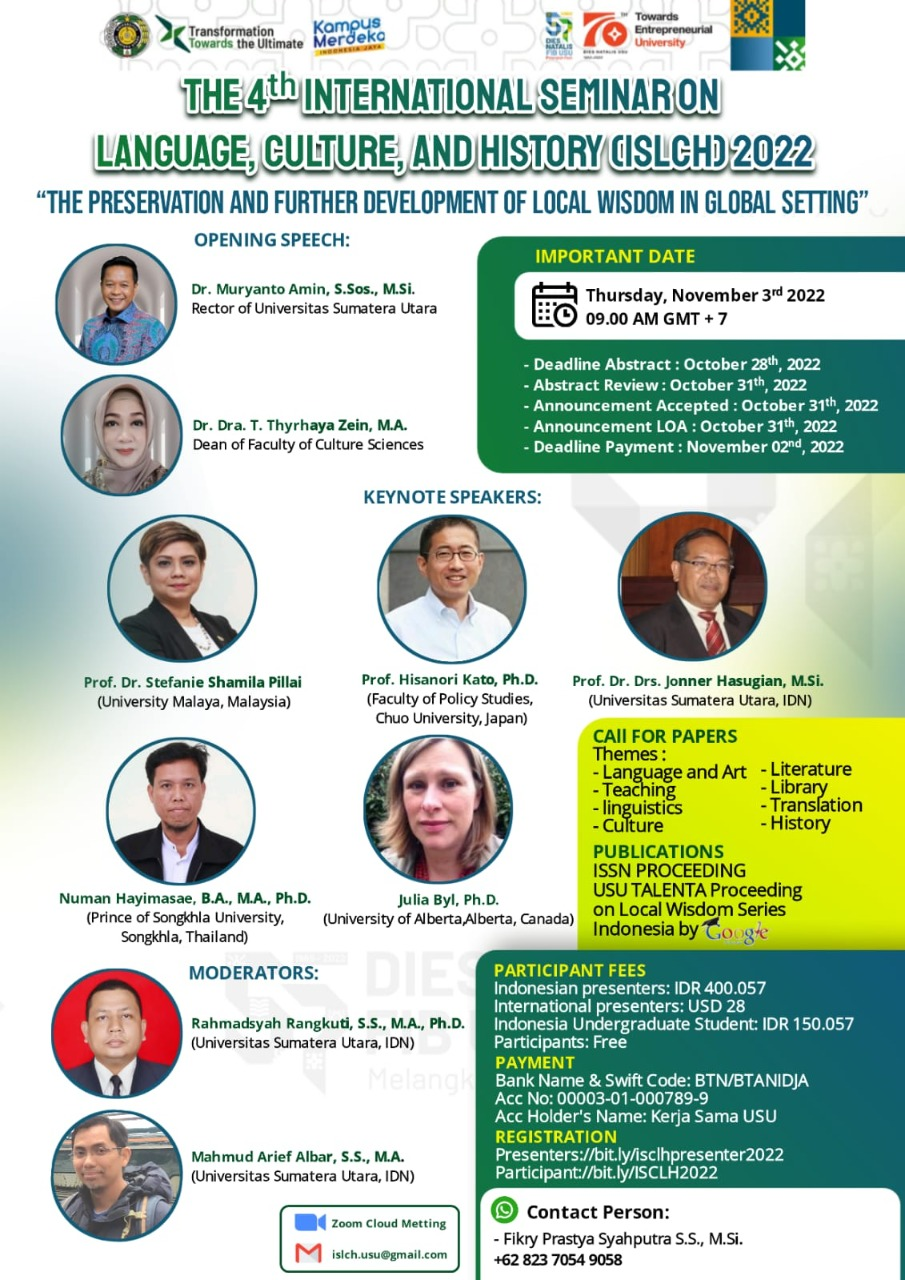
The 3rd International Seminar On Language, Culture And History (ISLCH) 2021
Sumatera Utara
Medan, ID
October 9, 2021 – October 10, 2021
Since the protos history, Southeast Asia has become a dinamically developing region. The regions of the Strait of Malacca played a very essential role in international trading activities since the first century. The fast flows at the Strait of Malacca made it the Sphere of Influence among Indian and Chinese kingdoms (Briyan, 2019: 79). In addition, European culture even influenced the cultural patterns of Southeast Asian society during the time of colonialism (Rahmawati, 2014:104). Colonialism has led to structural changes in Southeast Asia. Therefore, the influence of Hinduism-Buddhism, Islam and Western cultures, during the cultural development within this region, has shaped arts cultures and histories in each of Southeast Asian countries.The southeast Asian societies have experienced very rapid and significant changes in the fields of economics, education, socio-culture, and history (Turner, 2005:1; Hurrel, 2007:1 ). In 1967, along with the reality of socio-cultural and historical similarities shared, ten countries in this region established Association of Southeast Asian Nations (ASEAN) to make Southeast Asia a peaceful, safe, stable, and prosperous region by holding three major pillars, namely Political-Security Society pillar, ASEAN Economic Society pillar, and ASEAN Socio-Cultural Society Pillar. The vision “One Vision, One Identity, One Community" was declared in 2005 in Malaysia beginning the trend of natural and human resources development in the region of Southeast Asia (The Directorate General of ASEAN Cooperation & Secretary of Directorate General of ASEAN Cooperation, 2019: 5).The development of information and telecommunication technology has also accelerated the globalization process adapting to the era of Industrial Revolution 4.0. It created various new challenges and problems to solve, overcome and answer for the sake of globalization use for life. It could be said that globalization and advancement in information technology had been well applied in many forms of human activities which sparked a variety of issues such as cybersecurity, human rights and foreign workforce, geopolitics of South China Sea, health and education, arts preservation, culture and local wisdom. All of this which have attracted serious attention from all countries in this region (Secretary of Directorate General of ASEAN Cooperation & Directorate General of ASEAN Cooperation, The Ministry of Foreign Affairs of the Republic of Indonesia, 2017).In the end of 2019, Covid-19 or a global pandemic has struck countries all over the world. The countries in Southeast Asia have been fighting many ways to stop the virus lethal infection among the society in this region. Covid-19 has not only changed social behavior and culture, but it has also encouraged fast changes in reproduction of knowledge. The performance of arts, culture, and history is no longer like how it was in normal time before this global pandemic. In fact, the way people perform arts, practice their cultures, use communication, practice traditional ritual, and undergo their life habits have also changed. In order to harmonize the rapid development of digital science and technology, University of Sumatera Utara revitalizes the curriculum dynamically in accordance with the prevailing regulation in Indonesia and the market demand in research development so that it can be line up with the same position with the world's top universities along with preserve and straightening the value of BINTANG. Furthermore, USU’s long-term plan gives a mandate to seek the internationalization of the local excellence potential (TALENTA) with the result that USU is able to produce competent and innovative graduates consent with this era. One step to realize USU’s long-term plan, it is necessary for national and international collaboration with top universities through the excellent development such as local wisdom in the TALENTA. The changes in reproduction of knowledge (arts, language, culture, and history) from before and in the time of Covid-19 pandemic are what is being brought up as the theme of this international seminar in cooperation betwenn Faculty of Cultural Sciences, University of Sumatera Utara (USU) and School of Humanities University of Sains Malaysia (USM). The collaboration of these two universities proposes the theme of “The Role, Challenges, and Innovation of Local Wisdom in Asia.”
This is the International Online Seminar of the Faculty of Cultural Sciences, University of Sumatra Utara in 2021. The 3rd International Seminar on Language, Culture and History (ISLCH) in 2021, with the theme: “The Role, Challenges, and Innovation of Local Wisdom in Asia.”
Keynotes
- Prof. Dr. Robert Sibarani M.S. (University of Sumatera Utara, IDN)
- Prof. Dato’ Seri Dr. MD Salleh Yaapar (University Science of Malysia, USM)
- Prof. Uli Kozok, Ph.D. (Hawai University, USA)
- Prof. Toshiaki Kimura, Ph.D. (Tohoku University, JPN)
- Prof. Onrizal, Ph.D. (University of Sumatera Utara, IDN)
- Prof. Dr. Antonia Soriente (University of Naples L' Orientale, ITA)
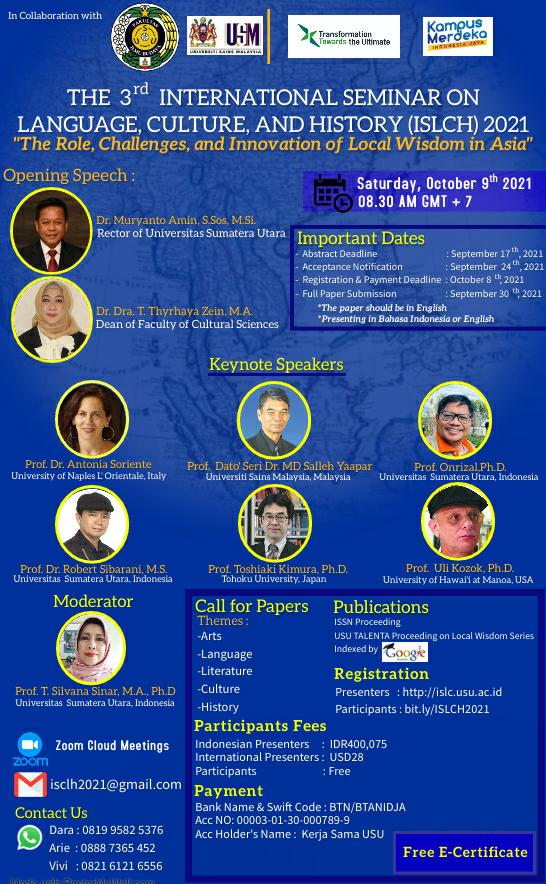
The composition of board committee of “The 3rd International Seminar on Language, Culture and History (ISLCH) 2021”
| Person in charge | : | Dean of Faculty of Cultural Sciences |
| : | Dean of School of Humanities | |
| : | All Vice Dean of Faculty of Cultural Sciences and School of Humanities | |
| Chairman | : | Alimansyar SS, M.A., Ph.D |
| Vice Chairman | : | Bambang Riyanto, S.S., M.Si |
:
:
INTERNATIONAL SEMINAR on LANGUAGES AND CULTURES and History (ISLCH) 2020
Virtual International Seminar
Medan, ID
September 12, 2020 – September 13, 2020
Since prehistoric times, Southeast Asia has become a dinamically developing region. The regions of Malaka Strait played a very essential role in international trading activities since the first century. The fast flows at Malaka Strait made it the sphere of influence among Indian and Chinese kingdoms (Briyan, 2019: 79). The Arabian traders coming from Middle East also took part in this trade channel (Burhanuddin, 2017:20). European culture even influenced the cultural patterns of Southeast asian society during the time of colonialism (Rahmawati, 2014: 104). Colonialism has led to structural changes in Southeast Asia. Therefore, the influence of Hinduism-Buddhism, Islam and Western cultures, during the cultrural development within this regiona, has shaped arts cultures and histories in each of Southeast Asian countries. The southeast Asian societies have experienced very rapid and significant changes in the fields of economics, education, socio-culture, and history (see Turner, 2005: 1; Hurrel, 2007: 1). In 1967, along with the reality of socio-cultural and historical similarities shared, ten countries in this region established Association of Southeast Asian Nations (ASEAN) to make Southeast Asia a peaceful, safe, stable, and prosperous region by holding three major pillars, namely Political-Security Society pillar, ASEAN Economic Society pillar, and ASEAN Socio-Cultural Society Pillar. Its vision “One Vision, One Identity, One Community" was declared in 2005 in Malaysia beginning the trend of natural and human resources development in the region of Southeast Asia (The Directorate General of ASEAN Cooperation & Secretary of Directorate General of ASEAN Cooperation, 2019: 5).
The development of information and telecommunication technology has also accelerated the globalization process. It created various new challenges and problems to solve, overcome and answer for the sake of globalization use for life. It could be said that globalization and advancement in information technology had been well applied in many forms of human activities which sparked a variety of issues such as cybersecurity, human rights and foreign workforce, geopolitics of South China Sea, health and education, arts preservation, culture and local wisdom, all of which have attracted serious attention from all countries in this region (Secretary of Directorate General of ASEAN Cooperation & Directorate General of ASEAN Cooperation, The Ministry of Foreign Affairs of the Republic of Indonesia, 2017).
In the end of 2019, Covid-19 or a global pandemic has struck countries all over the world. The countries in Southeast Asia have been fighting many ways to stop the virus lethal infection among the society in this region. Covid-19 has not only changed social behavior and culture, but it has also encouraged fast changes in reproduction of knowledge. The performance of arts, culture, and history is no longer like how it was in normal time before this global pandemic. In fact, the way people perform arts, practice their cultures, use communication, practice traditional ritual, and undergo their life habits have also changed.
The changes in reproduction of knowledge (arts, language, culture, and history) from before and in the time of Covid-19 pandemic are what is being brought up as the theme of this international seminar in cooperation betwenn faculty of Cultural Sciences, University of Sumatera Utara and University of Sains Malaysia. The collaboration of these two universities proposes the theme of “The Development of Arts, Language, Culture, and History in Southeast Asia”.
Keynote Speakers
- Prof.Dato Seri Dr. Md.Salleh Yafaar (University Sains Malaysia)
- Dr. Surasak Jamnongsarn (Srinakharinwirot University Bangkok Thailand)
- Dr. William Bradley Horton (Akita University Japan)
- Dr.Kundharu Saddhono, S.S, M.Hum (University Sebelas Maret Surakarta Indonesia)
- Dr. M.Takari, M.Hum (Universitas Sumatera Utara Indonesia)
Committee
- Dr. Mulyadi, M.Hum. (Chairman)
- M. Pujiono, M.Hum., Ph.D (secretary)
Organizer
In cooperation between Faculty of Cultural Sciences, University of Sumatera Utara - Faculty of Arts and Humanities, University of Sains Malaysia.
INTERNATIONAL SEMINAR ON LANGUAGES AND CULTURES (ISLC) 2019
Gelanggang Mahasiswa USU and Grandhika Hotel, Medan
Medan, ID
September 25, 2019 – September 26, 2019
INTRODUCTION
Every country in this world have their own language characteristic, identity of the country and distinguish from other country. Language play a role to show the identity of their nation. Because of that, every country make effort to develop, maintain the presence of their language in global era to fulfill their function as medium of modern communication in the word. Beside language, identity of a country reflected from tradition, culture, and other local tradition that done by their society. Lately, nations in the world active to conserve and introduce their local cultural arts to international world.In Asia nations neighborhood, especially the nations that join Asean+3 (Japan, China, and South Korea) in 2003 in Bali, Indonesia officially announce the further cooperation programs that purposed to make the resemblance cultural between countries become unifier of Asean+3 countries. The program specially purpose to Asean+3 teenager to execute Asean Socio-Cultural Community. The intent of programs is to use culture as unifier Asean+3 nations. Also, create forums that discus about Asean value and how to understand the difference, organize projects to rise the understanding about similarity in history and art. Beside of that, manage student exchange programs and research collaboration between universities.
Keynote/Invited Speakers
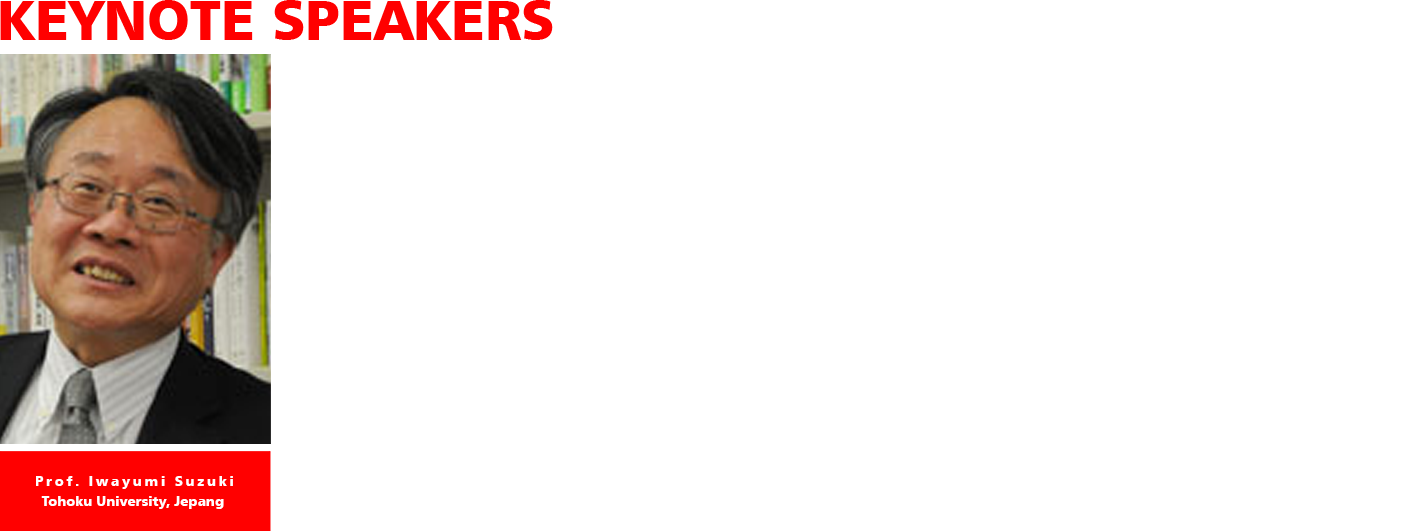
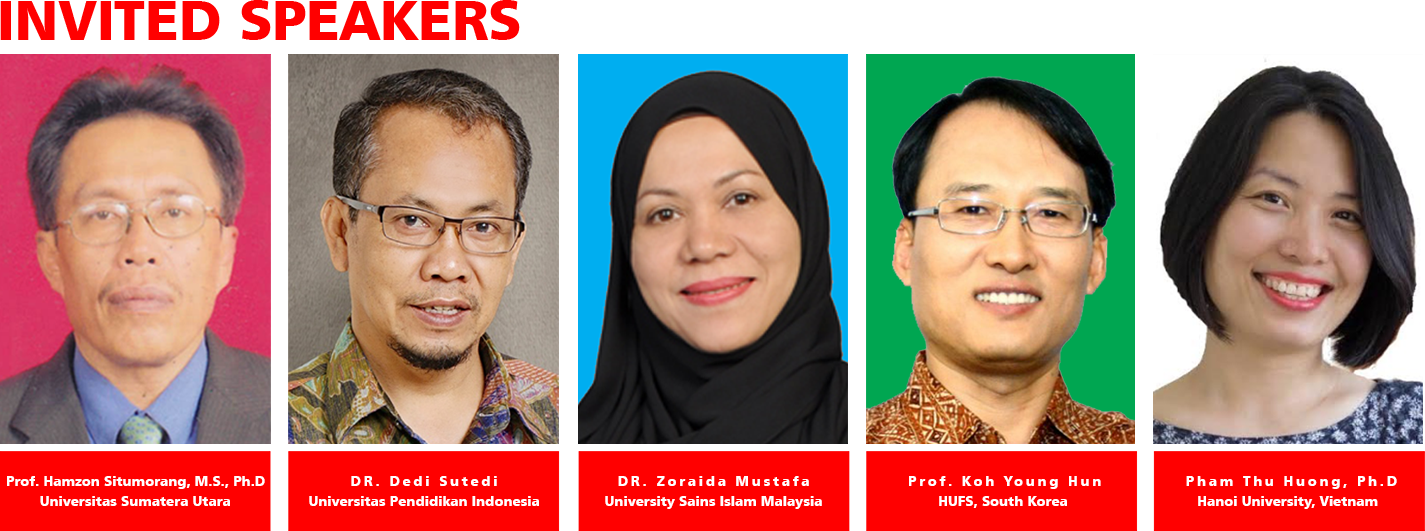
Organizing Committee
| Chairman | : | Alimansyar, Ph.D |
| Secretary | : | Rani Arfianty, M.Phil |
| Treasurer | : | Adriana Hasibuan, M.Hum |
| Secretariat | : | M.Pujiono, M.Hum., Ph.D |
| Event | : | DRA. Heristina Dewi, M.Pd |
| Publicity | : | Irwan, M.Si |
| Liaison | : | Dr. Siti Muharami Malayu, M.Hum |
Honorary Board
- Prof. Dr. Runtung Sitepu, S.H., M.Hum (Rector, University of Sumatera Utara)
- Drs. Mahyuddin K.M Nasution, M.I.T., Ph.D (University of Sumatera Utara)
- Dr. Budi Agustono, MS (Dean of Faculty of Humanities, University of Sumatera Utara)
International Board
- Prof. Sirimonporn Suriyawongpaisai (Chulalongkorn University)
- Prof. Tosiaki Kimura (Tohoku University, Japan)
- Prof. Kamila binti Ghazali (University of Malaya, Malaysia)
- Dennis Barbour (Purdue University, America)
Editorial Board
- Bambang Purwanto (Indonesia)
- Freek Colimbijn ( Nederland )
- Timo Kaartinen (University of Helsinki, Finland)
- Adrian Vickers (University of Sidney, Australia)
The International seminar on languages and cultures in Asia (ISLC-FIB USU)


